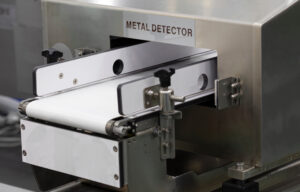Metal detection in the food industry is one of the most important steps that can be taken to ensure food safety.
There are a number of ways that metal can find its way into food, and it can be dangerous for consumers. That’s why metal detection is so important – it helps to prevent any metal from getting into food and causing harm. In this blog post, we will discuss the importance of metal detection in the food industry and how it helps to keep us safe!
What is metal detection and how does it work in the food industry specifically
For starters, metal detection is the process of using a metal detector to find metal objects. In the food industry, metal detectors are used to find pieces of metal in food products. The metal detector works by sending out an electromagnetic field that interacts with the metal object. When the metal object is found, the metal detector will sound an alarm or display a message on a screen. Moreover, metal detectors can be used to inspect both dry and wet products.
There are two main types of metal detectors that are used in the food industry:
– Magnetic metal detectors
– X-ray metal detectors
Magnetic metal detectors work by detecting metal objects that are ferrous, or magnetic. These metal detectors are used to find small metal objects, such as metal fragments or metal shavings. On the other hand, X-ray metal detectors work by sending out an X-ray beam that passes through the product. If there is a metal object in the product, it will be detected by the X-ray metal detector.
How important is metal detection in ensuring food safety for consumers
Metal detectors are important in the food industry because metal objects in food can be dangerous to consumers. Metal objects can end up in food products during the manufacturing process. For example, metal objects can fall into food while it is being processed on a conveyor belt. Metal objects can also be found in food that has been packaged in recycled metal cans or metal containers.
Metal detectors can help to ensure the safety of consumers by finding metal objects in food before it is consumed. Metal detectors can also help to protect the reputation of the food industry by preventing metal contaminated food from reaching consumers.
The benefits of using metal detection in the food industry
There are many benefits that come with using metal detection in the food industry. One of the most important benefits is that it helps to ensure the safety of the food that we consume, and food metal detectors save lives if used. Metal contamination can occur at any stage of the food production process, so it is important to have a metal detection system in place to catch any contaminants before they end up in our food.
Another benefit of metal detection in the food industry is that it can help to improve the quality of the food. Contaminants can often damage food products, making them less safe to eat and lowering their overall quality. By catching these contaminants before they enter the food supply, metal detection can help to ensure that only high-quality food products reach our shelves.
Metal detection is also an important tool in the food industry because it can help to reduce waste. Contaminated food products often have to be thrown away, which can lead to a lot of wasted food. By catching contaminants before they enter the food supply, metal detection can help to reduce the amount of waste generated by the food industry.
How different metals can affect the taste of food and how to avoid this
What many people don’t know is that metal can actually affect the taste of food. For example, if there is iron in the water that was used to cook pasta, the pasta will likely have a metallic taste. This is why it’s important to use metal-free cooking utensils and storage containers. Additionally, certain metals can react with food and cause chemical changes. For example, aluminum foil should not be used to store tomatoes because the acid in tomatoes will cause the aluminum to leach into the food.
Ways to improve metal detection in the food industry
There are a few ways to help metal detection become more effective in the food industry. Some of these include:
-Regular calibration checks
-Minimizing metal contaminants
-Improving product flow
With regular calibration checks, metal detectors can be more accurate in detecting smaller metal fragments. If there are fewer metal contaminants present, it will be easier for the metal detector to identify them. Lastly, by improving product flow, metal detectors will have a better chance of detecting metal contaminants that may be present.
Are there any potential drawbacks to using metal detection in the food industry?
You should always consult with an experienced metal detection provider to ensure you are getting the best system for your specific application and product. Additionally, while metal detectors are highly sensitive, they cannot detect all metal contaminants. For example, metal shards that are smaller than the aperture of the metal detector’s coil will not be detected.
Another potential drawback to using metal detectors is that they can generate a high number of false positives. This means that metal detectors may sometimes indicate the presence of metal where there is none. False positives can occur for a variety of reasons, including metal fragments clinging to product packaging or metal deposits in the product itself. To reduce the number of false positives, metal detectors must be properly calibrated and maintained.
How can businesses ensure that they are using metal detection effectively in their operations?
When metal detectors are used in the food industry, there are certain procedures that should be followed to ensure safety and quality control. Here are a few tips:
– metal detectors should be properly calibrated on a regular basis
– all food products should be inspected thoroughly before entering the metal detector
– any product that is found to contain metal fragments should be removed and discarded
To conclude, metal detection in the food industry is an important process to ensure the safety of consumers. It is a crucial step in the manufacturing process that can prevent metal contaminants from entering the food supply chain. While metal detectors are not 100% effective, they are a critical tool in protecting public health.
Read more:
Metal Detection in the Food Industry: How Important Is It?
















